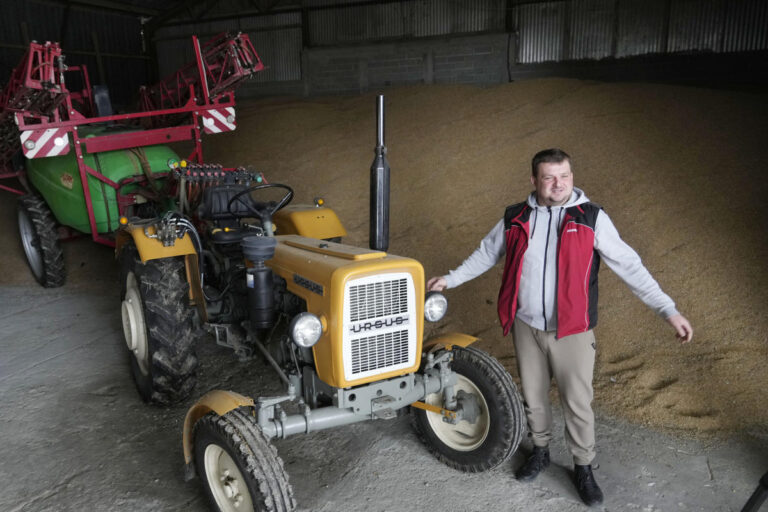CYWINY WOJSKIE, Poland (AP) – Piotr Kolycki picked up a handful of wheat and watched the yellow grains flow through his fingers.
All around him, grain is piled up in warehouses on his farm north of the Polish capital. Hundreds of tons of wheat, rye and corn remain from last year's harvest, which he cannot sell for a profit.
With a new harvest on the horizon, he feels pressured to sell what he has to avoid spoiling.
“The conditions in our market are really, really tough. If nothing changes, we could be in a crisis situation in a year or two,” Kolicki said.
Korycki's frustration led him to help organize the protests that have been taking place in Poland for the past three months, as part of farmers' protests across Europe. An update in Poland is expected on Wednesday.
His garden is filled with giant round bales of hay and modern farm equipment, evidence of the changes that have taken place in Polish agriculture since the country joined the European Union almost 20 years ago. The family grows wheat, rye, corn and sugar beets on his 200 hectares (about 500 acres).
The 34-year-old, a farmer like his father and grandfather, says Russia's war with Ukraine has severely destabilized his business. This is the result of the EU's decision to allow free trade with Ukraine after the war began.
The disruption of Ukraine's exports via the Black Sea resulted in a large flow of grain across the Polish-Ukrainian border, causing food prices to fall, while inflation increased production costs and loan interest rates.
Kolicki felt no pain during the first year of the war. Grain prices rose initially, but then fell below their original levels. Although they managed to sell some of last year's harvest, they still have 300 tons of unsold grain left. The surplus equates to a loss of 100,000 zlotys ($25,000), which he calls “very large.”
Previously, he would have transported grain to the Baltic coast and sold it to buyers who exported it abroad by ship. But his price collapse means that what he gets won't cover his shipping costs. He thinks the best he can do is sell it close to home as livestock feed at a loss.
“This will be very important because land prices are rising, the prices of production goods are at high levels, and the prices of finished products are continuously falling,” he said.
What should the EU do with the grain, Korycki said, “where to export it, under what conditions and for how much? So this problem will get even worse.”
Polish Prime Minister Donald Tusk has acknowledged the reality of the problem and, after serving as President of the European Council from 2014 to 2019, called for relief for farmers in Brussels, and his voice carries weight. have.
Tusk said Europe has well over 20 million tonnes of surplus grain stored, with Poland alone having 9 million tonnes.
“And the summer harvest hasn't even started yet,” Tusk said in late February. “We don’t yet have the infrastructure to export more of this grain.”
Adding to the anger of farmers across Europe is the EU's plan to combat climate change with a policy called the Green Deal, which they say will increase paperwork and worsen public finances.
Despite warnings from scientists that agricultural production must become more environmentally sustainable in an era of climate change, the European Commission has bowed to their pressure by withdrawing some environmental requirements. Despite this, the calls from European farmers are becoming increasingly harsh.
Paulina Sobieciak Penszko, a sociologist and agriculture expert at the Warsaw Institute of Public Affairs, said the protests have become more extreme and are being used by pro-Russian groups to promote anti-Ukrainian policies. he claimed.
What is being lost is the need to respond to the climate crisis, which requires new agricultural policies, and the needs of consumers, who would especially benefit from reduced pesticide use in agriculture, she said. insisted.
“These consumer voices are never heard in the discussion,” she says.
Mr Kolicki is encouraging other farmers to vote in June's European Parliament elections as part of his work with unions representing farmers' interests.
“Every problem starts with the European Parliament,” he said. “We will strive to raise public awareness so that the votes that society casts are well-considered and rational.”
He believes the most logical choice is the Union, an anti-EU and one of Poland's most vocal right-wing parties against imports from Ukraine.
Mr Kolicki said the only party that seemed to have the answers to farmers' problems was the Coalition. Although he acknowledges that the EU has boosted the development of the agricultural sector, he believes that overall family life has not improved.
“You don't get anything for free,” he said of the EU. “What they gave us, they are now taking away.”
Sobieciak-Pensko believes the growing discontent among farmers shows that policymakers did not adequately communicate their case to farmers during the years when they were planning reforms. There is.
“Farmers are not ready for change,” she says. “They don't understand the purpose and meaning of environmental change.”
Korycki found herself hoping that the war in Ukraine would end soon and that the overall situation in this central European country of 38 million people would stabilize.
Beyond that, he doesn't really have a plan. He has equipment loans that need to be paid back, and says farming is not a profession that can be changed on a whim.
“Generations have been working towards this,” he says, sitting in his family's kitchen. “There are emotional and family values here, but there are also long-term obligations.”


